Can Information about Pandemics Increase Negative Attitudes toward Foreign Groups? A Case of COVID-19 Outbreak
Abstract
1. Introduction
2. Study 1
2.1. Materials and Methods
2.1.1. Participants
2.1.2. Procedure
2.2. Results
3. Study 2
3.1. Materials and Methods
3.1.1. Participants
3.1.2. Procedure
3.2. Results
3.2.1. Anxiety and Information about Coronavirus
3.2.2. Attitudes toward Foreigners—Mediation Analysis
4. General Discussion
Author Contributions
Funding
Conflicts of Interest
References
- Wu, Z.; McGoogan, J.M. Characteristics of and important lessons from the coronavirus disease 2019 (COVID-19) outbreak in China: Summary of a report of 72 314 cases from the Chinese Center for Disease Control and Prevention. JAMA 2020, 323, 1239–1242. [Google Scholar] [CrossRef] [PubMed]
- Heymann, D.L.; Shindo, N. COVID-19: What is next for public health? Lancet 2020, 395, 542–545. [Google Scholar] [CrossRef]
- Lipsitch, M.; Swerdlow, D.L.; Finelli, L. Defining the epidemiology of Covid-19—studies needed. N. Engl. J. Med. 2020, 382, 1194–1196. [Google Scholar] [CrossRef] [PubMed]
- Liu, S.-L.; Saif, L. Emerging viruses without borders: The Wuhan coronavirus. Viruses 2020, 12, 130. [Google Scholar] [CrossRef]
- McKibbin, W.J.; Fernando, R. The Global Macroeconomic Impacts of COVID-19: Seven Scenarios. 2 March 2020. Available online: https://ssrn.com/abstract=3547729 (accessed on 10 April 2020).
- Baldwin, R.; di Mauro, B.W. Economics in the Time of COVID-19; Centre for Economic Policy Research: London, UK, 2020. [Google Scholar]
- Di Marco, M.; Baker, M.L.; Daszak, P.; De Barro, P.; Eskew, E.A.; Godde, C.M.; Harwood, T.D.; Herrero, M.; Hoskins, A.J.; Johnson, E. Opinion: Sustainable development must account for pandemic risk. Proc. Natl. Acad. Sci. USA 2020, 117, 3888–3892. [Google Scholar] [CrossRef]
- Plohl, N.; Musil, B. Modeling compliance with COVID-19 prevention guidelines: The critical role of trust in science. Psychol Health Med. 2020. [Google Scholar] [CrossRef]
- Oosterhoff, B.; Palmer, C.A.; Wilson, J.; Shook, N. Adolescents’ Motivations to Engage in Social Distancing during the COVID-19 Pandemic: Associations with Mental and Social Health. J. Adolesc. Health 2020. [Google Scholar] [CrossRef]
- Šrol, J.; Mikušková, E.B.; Cavojova, V. When we are worried, what are we thinking? Anxiety, lack of control, and conspiracy beliefs amidst the COVID-19 pandemic. PsyArXiv Prepr. 2020. [Google Scholar] [CrossRef]
- Erceg, N.; Ružojčić, M.; Galic, Z. Misbehaving in the Corona Crisis: The Role of Anxiety and Unfounded Beliefs. PsyArXiv Prepr. 2020. [Google Scholar] [CrossRef]
- Gelfand, M.; Jackson, J.C.; Pan, X.; Nau, D.; Dagher, M.; Chiu, C.-Y. Cultural and Institutional Factors Predicting the Infection Rate and Mortality Likelihood of the COVID-19 Pandemic. 2020. Available online: https://psyarxiv.com/m7f8a (accessed on 10 April 2020).
- Wang, C.; Pan, R.; Wan, X.; Tan, Y.; Xu, L.; Ho, C.S.; Ho, R.C. Immediate psychological responses and associated factors during the initial stage of the 2019 coronavirus disease (COVID-19) epidemic among the general population in China. Int. J. Environ. Res. Public Health 2020, 17, 1729. [Google Scholar] [CrossRef]
- Esses, V.M.; Jackson, L.M.; Dovidio, J.F.; Hodson, G. Instrumental relations among groups: Group competition, conflict, and prejudice. Nat. Prejud. Fifty Years Allport 2005, 227–243. [Google Scholar] [CrossRef]
- Bilewicz, M. History as an obstacle: Impact of temporal-based social categorizations on Polish-Jewish intergroup contact. Gr. Process. Intergr. Relations 2007, 10, 551–563. [Google Scholar] [CrossRef]
- Zagefka, H.; González, R.; Brown, R.; Lay, S.; Manzi, J.; Didier, N. To know you is to love you: Effects of intergroup contact and knowledge on intergroup anxiety and prejudice among indigenous Chileans. Int. J. Psychol. 2017, 52, 308–315. [Google Scholar] [CrossRef] [PubMed]
- Fiske, S.T. Stereotyping, prejudice, and discrimination. Handb. Soc. Psychol. 1998, 2, 357–411. [Google Scholar]
- Butz, D.A.; Yogeeswaran, K. A new threat in the air: Macroeconomic threat increases prejudice against Asian Americans. J. Exp. Soc. Psychol. 2011, 47, 22–27. [Google Scholar] [CrossRef]
- Karwowski, M.; Kowal, M.; Groyecka, A.; Białek, M.; Lebuda, I.; Sorokowska, A.; Sorokowski, P. When in danger, turn right: Does covid-19 threat promote social conservatism and right-wing presidential candidates? Hum. Ethol. 2020, in press. [Google Scholar]
- Murray, D.R.; Schaller, M. Threat (s) and conformity deconstructed: Perceived threat of infectious disease and its implications for conformist attitudes and behavior. Eur. J. Soc. Psychol. 2012, 42, 180–188. [Google Scholar] [CrossRef]
- Thornhill, R.; Fincher, C.L.; Aran, D. Parasites, democratization, and the liberalization of values across contemporary countries. Biol. Rev. 2009, 84, 113–131. [Google Scholar] [CrossRef]
- Schaller, M.; Murray, D.R. Pathogens, personality, and culture: Disease prevalence predicts worldwide variability in sociosexuality, extraversion, and openness to experience. J. Pers. Soc. Psychol. 2008, 95, 212–221. [Google Scholar] [CrossRef]
- Murray, D.R.; Trudeau, R.; Schaller, M. On the origins of cultural differences in conformity: Four tests of the pathogen prevalence hypothesis. Personal. Soc. Psychol. Bull. 2011, 37, 318–329. [Google Scholar] [CrossRef]
- Faulkner, J.; Schaller, M.; Park, J.H.; Duncan, L.A. Evolved disease-avoidance mechanisms and contemporary xenophobic attitudes. Gr. Process. Intergr. Relations 2004, 7, 333–353. [Google Scholar] [CrossRef]
- Navarrete, C.D.; Fessler, D.M.T. Disease avoidance and ethnocentrism: The effects of disease vulnerability and disgust sensitivity on intergroup attitudes. Evol. Hum. Behav. 2006, 27, 270–282. [Google Scholar] [CrossRef]
- Prati, G.; Pietrantoni, L. Knowledge, risk perceptions, and xenophobic attitudes: Evidence from italy during the ebola outbreak. Risk Anal. 2016, 36, 2000–2010. [Google Scholar] [CrossRef] [PubMed]
- Nisbett, R. The Geography of Thought: How Asians and Westerners Think Differently and Why; Simon and Schuster: The Free Press: New York, NY, USA, 2003; ISBN 0743255356. [Google Scholar]
- Xu, Y.; Farver, J.A.; Schwartz, D.; Chang, L. Social networks and aggressive behaviour in Chinese children. Int. J. Behav. Dev. 2004, 28, 401–410. [Google Scholar] [CrossRef]
- Pew Research Center. Table: Religious Composition by Country, in Percentages. 2012. Available online: https://www.pewforum.org/2012/12/18/table-religious-composition-by-country-in-percentages/ (accessed on 25 May 2020).
- Bogardus, E.S. A social distance scale. Sociol. Soc. Res. 1933, 17, 265–271. [Google Scholar]
- Wark, C.; Galliher, J.F. Emory Bogardus and the origins of the social distance scale. Am. Sociol. 2007, 38, 383–395. [Google Scholar] [CrossRef]
- Groyecka, A.; Witkowska, M.; Wróbel, M.; Klamut, O.; Skrodzka, M. Challenge your stereotypes! Human Library and its impact on prejudice in Poland. J. Community Appl. Soc. Psychol. 2019, 29, 311–322. [Google Scholar] [CrossRef]
- Soral, W.; Bilewicz, M.; Winiewski, M. Exposure to hate speech increases prejudice through desensitization. Aggress. Behav. 2018, 44, 136–146. [Google Scholar] [CrossRef]
- Brener, L.; Von Hippel, W.; Kippax, S. Prejudice among health care workers toward injecting drug users with hepatitis C: Does greater contact lead to less prejudice? Int. J. Drug Policy 2007, 18, 381–387. [Google Scholar] [CrossRef]
- Piston, S. How explicit racial prejudice hurt Obama in the 2008 election. Polit. Behav. 2010, 32, 431–451. [Google Scholar] [CrossRef]
- Witkowska, M.; Beneda, M.; Čehajić-Clancy, S.; Bilewicz, M. Fostering Contact After Historical Atrocities: The Potential of Moral Exemplars. Polit. Psychol. 2019, 40, 565–582. [Google Scholar] [CrossRef]
- Schaller, M.; Duncan, L.A. The behavioral immune system: Its evolution and social psychological implications. In Evolution and the Social Mind: Evolutionary Psychology and Social Cognition; Forgas, J.P., Haselton, M.G., von Hippel, W., Eds.; Psychology Press: New York, NY, USA, 2007; pp. 293–307. [Google Scholar]
- Inbar, Y.; Westgate, E.C.; Pizarro, D.A.; Nosek, B.A. Can a naturally occurring pathogen threat change social attitudes? Evaluations of gay men and lesbians during the 2014 Ebola epidemic. Soc. Psychol. Personal. Sci. 2016, 7, 420–427. [Google Scholar] [CrossRef]
- Shaver, J.H.; Sibley, C.G.; Osborne, D.; Bulbulia, J. News exposure predicts anti-Muslim prejudice. PLoS ONE 2017, 12, e0174606. [Google Scholar] [CrossRef] [PubMed]
- Omyła-Rudzka, M. Stosunek Polaków do innych narodów. Warszawa Cent. Badania Opinii Społecznej. Retrived Sept. 2012, 20, 1–11. Available online: https://cbos.pl/SPISKOM.POL/2019/K_017_19.PDF (accessed on 5 April 2020).
- Guimond, S.; Crisp, R.J.; De Oliveira, P.; Kamiejski, R.; Kteily, N.; Kuepper, B.; Lalonde, R.N.; Levin, S.; Pratto, F.; Tougas, F. Diversity policy, social dominance, and intergroup relations: Predicting prejudice in changing social and political contexts. J. Pers. Soc. Psychol. 2013, 104, 941. [Google Scholar] [CrossRef] [PubMed]
- Schlueter, E.; Meuleman, B.; Davidov, E. Immigrant Integration policies and perceived Group Threat: A Multilevel Study of 27 Western and Eastern European Countries. Soc. Sci. Res. 2013, 42, 670–682. [Google Scholar] [CrossRef]
- Ki, M. What do we really fear? The epidemiological characteristics of Ebola and our preparedness. Epidemiol. Health 2014, 36, e2014014. [Google Scholar] [CrossRef][Green Version]
- Al-Rabiaah, A.; Temsah, M.H.; Al-Eyadhy, A.A.; Hasan, G.M.; Al-Zamil, F.; Al-Subaie, S.; Alsohime, F.; Jamal, A.; Alhaboob, A.; Al-Saadi, B.; et al. Middle East Respiratory Syndrome-Corona Virus (MERS-CoV) associated stress among medical students at a university teaching hospital in Saudi Arabia. J. Infect. Public Health 2020. [Google Scholar] [CrossRef]
- Mertens, G.; Gerritsen, L.; Salemink, E.; Engelhard, I. Fear of the coronavirus (COVID-19): Predictors in an online study conducted in March 2020. PsyArXiv Prepr. 2020. [Google Scholar] [CrossRef]
- Xu, C.; Liu, M.Y. Social Cost with No Political Gain: The “Chinese Virus” Effect. 2020. Available online: https://psyarxiv.com/j4t2r (accessed on 10 April 2020).
- Wilder-Smith, A.; Freedman, D.O. Isolation, quarantine, social distancing and community containment: Pivotal role for old-style public health measures in the novel coronavirus (2019-nCoV) outbreak. J. Travel Med. 2020, 27, taaa020. [Google Scholar] [CrossRef]
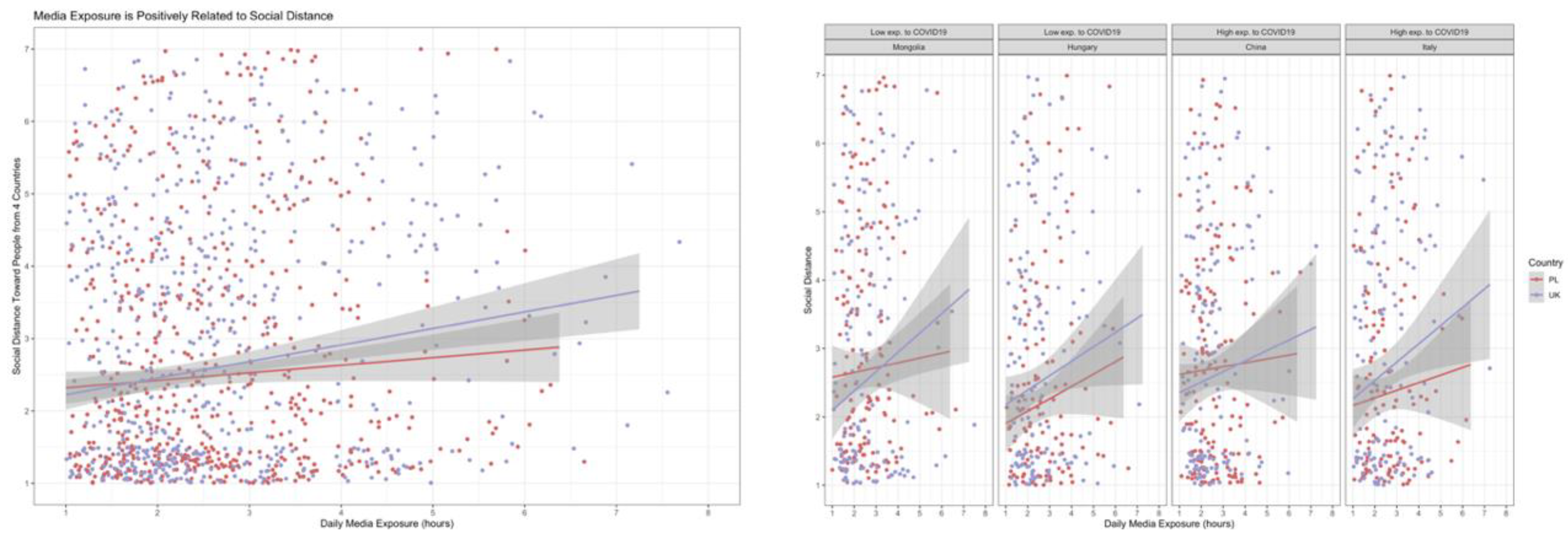
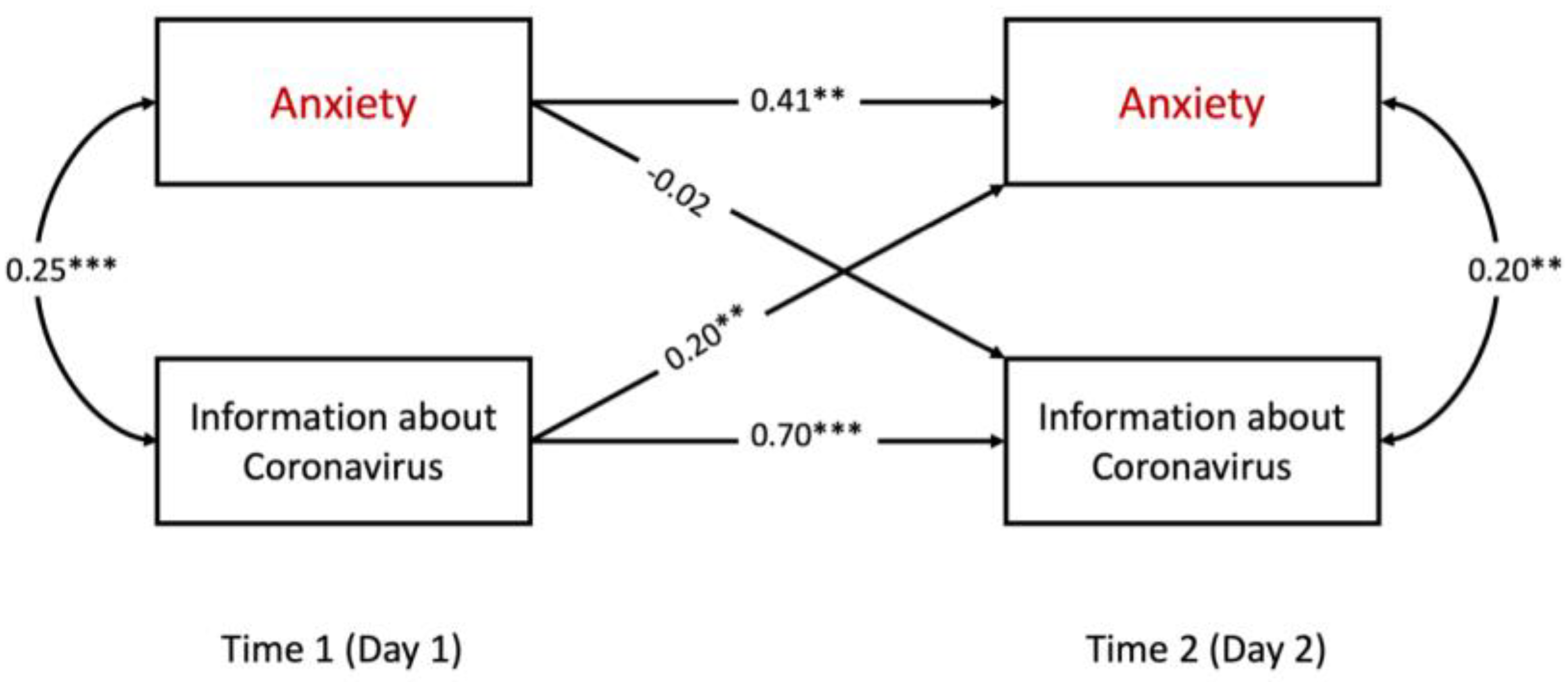
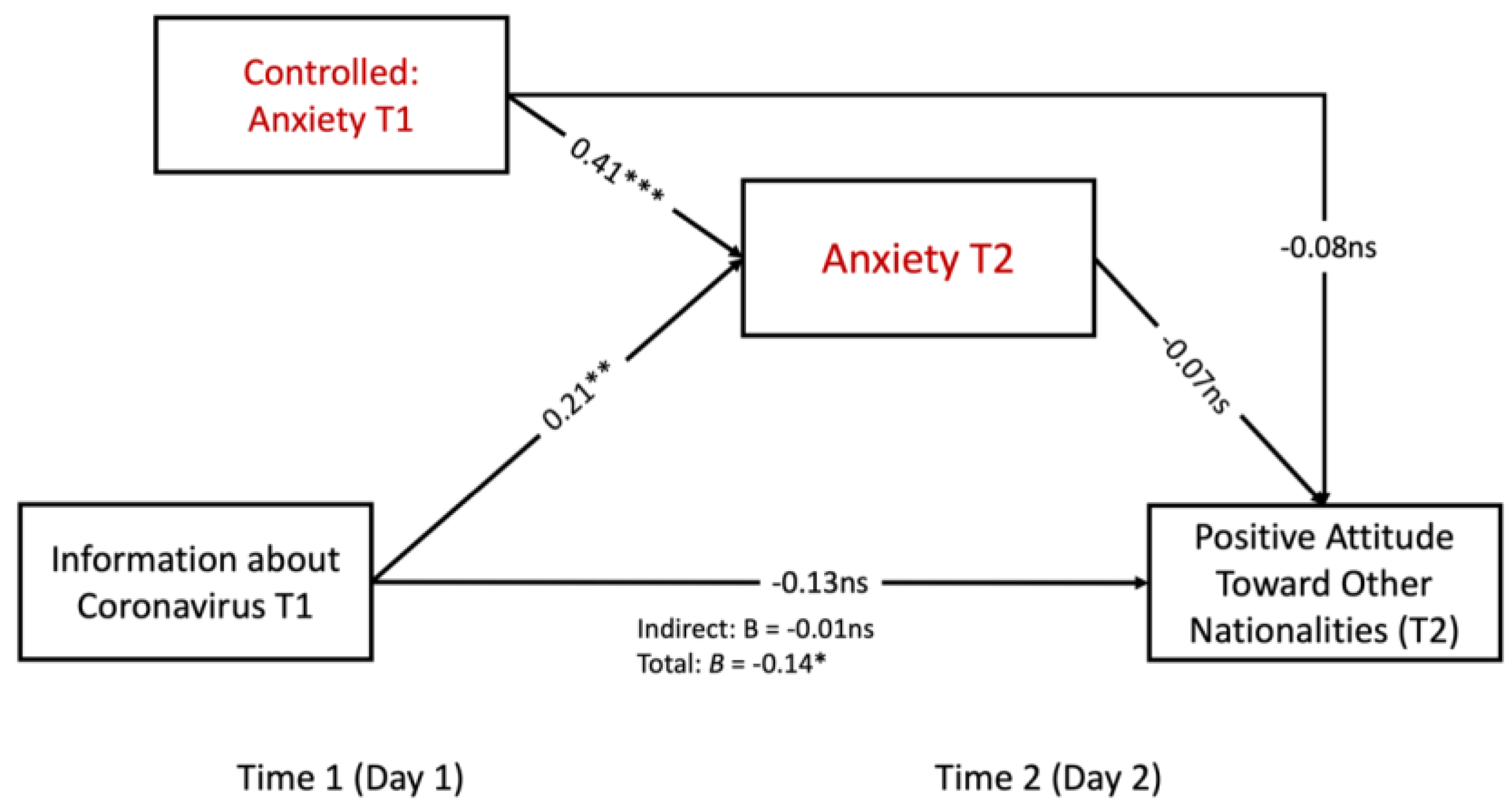
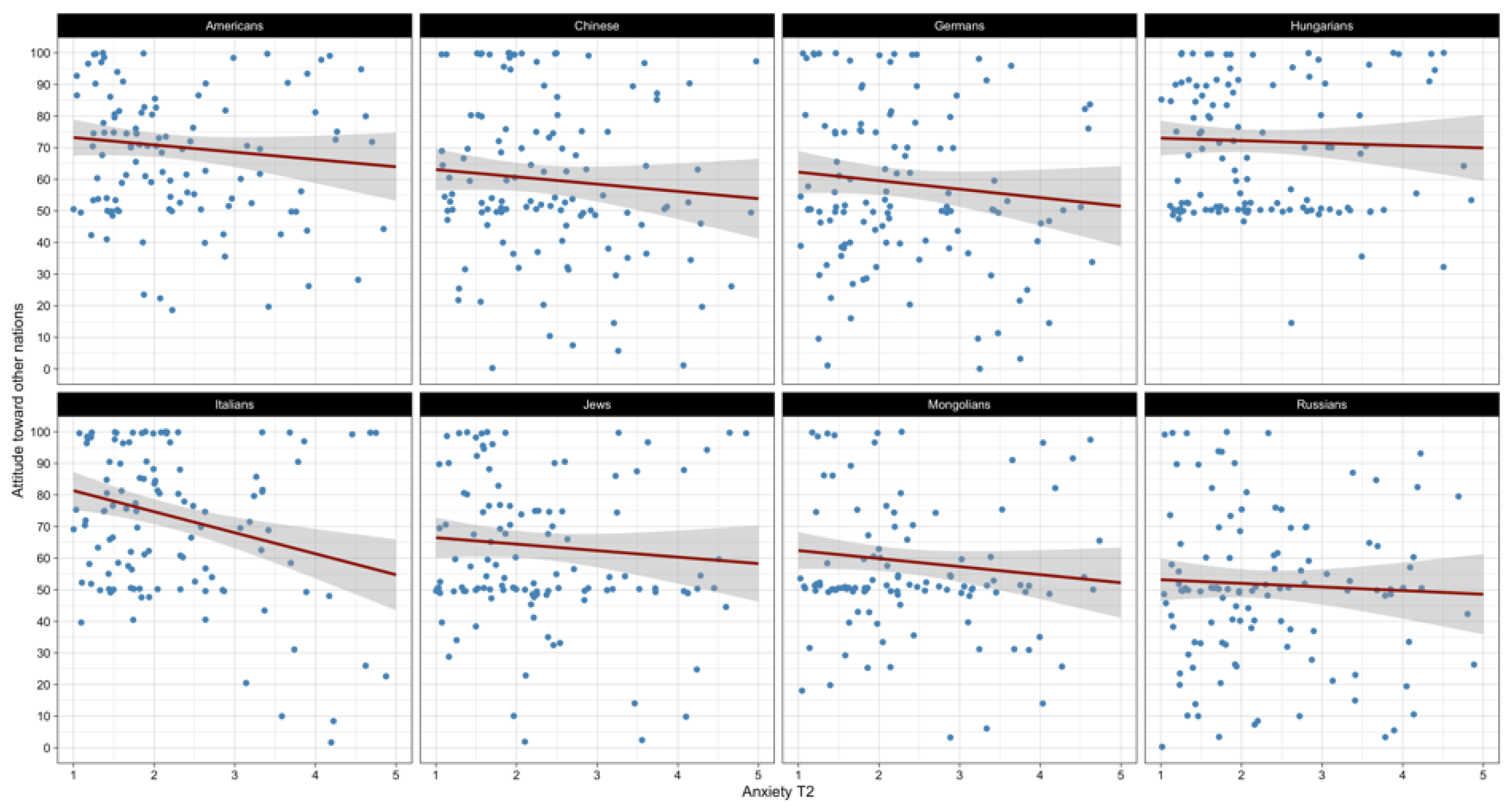
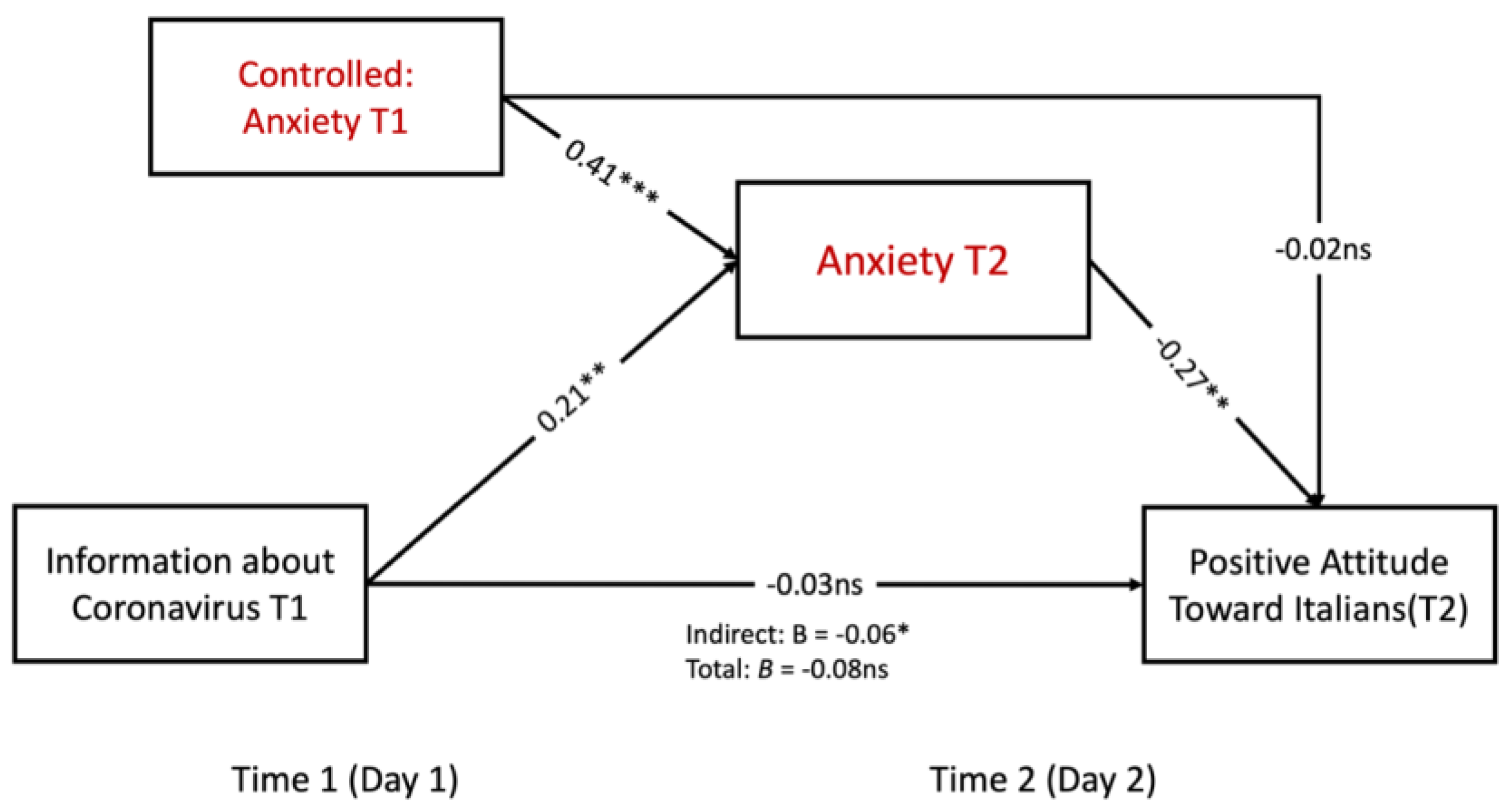
| Predictor | B (SE) | 95% CI | p |
|---|---|---|---|
| Intercept | 2.54 (0.09) | 2.37, 2.70 | <0.001 |
| Media | 0.18 (0.04) | 0.10, 0.26 | <0.001 |
| Participants’ country (0 = PL, 1 = UK) | 0.07 (0.08) | −0.08, 0.22 | 0.336 |
| Sex (0 = man, 1 = women) | −0.32 (0.10) | −0.53, −0.12 | 0.002 |
| Age | 0.006 (0.05) | −0.09, 0.11 | 0.90 |
| Nation (Mongolians = reference category) | |||
| Hungarians | 0.29 (0.10) | 0.09, 0.49 | 0.004 |
| Chinese | −0.04 (0.10) | −0.16, 0.24 | 0.698 |
| Italians | 0.10 (0.10) | −0.09, 0.31 | 0.290 |
© 2020 by the authors. Licensee MDPI, Basel, Switzerland. This article is an open access article distributed under the terms and conditions of the Creative Commons Attribution (CC BY) license (http://creativecommons.org/licenses/by/4.0/).
Share and Cite
Sorokowski, P.; Groyecka, A.; Kowal, M.; Sorokowska, A.; Białek, M.; Lebuda, I.; Dobrowolska, M.; Zdybek, P.; Karwowski, M. Can Information about Pandemics Increase Negative Attitudes toward Foreign Groups? A Case of COVID-19 Outbreak. Sustainability 2020, 12, 4912. https://doi.org/10.3390/su12124912
Sorokowski P, Groyecka A, Kowal M, Sorokowska A, Białek M, Lebuda I, Dobrowolska M, Zdybek P, Karwowski M. Can Information about Pandemics Increase Negative Attitudes toward Foreign Groups? A Case of COVID-19 Outbreak. Sustainability. 2020; 12(12):4912. https://doi.org/10.3390/su12124912
Chicago/Turabian StyleSorokowski, Piotr, Agata Groyecka, Marta Kowal, Agnieszka Sorokowska, Michał Białek, Izabela Lebuda, Małgorzata Dobrowolska, Przemysław Zdybek, and Maciej Karwowski. 2020. "Can Information about Pandemics Increase Negative Attitudes toward Foreign Groups? A Case of COVID-19 Outbreak" Sustainability 12, no. 12: 4912. https://doi.org/10.3390/su12124912
APA StyleSorokowski, P., Groyecka, A., Kowal, M., Sorokowska, A., Białek, M., Lebuda, I., Dobrowolska, M., Zdybek, P., & Karwowski, M. (2020). Can Information about Pandemics Increase Negative Attitudes toward Foreign Groups? A Case of COVID-19 Outbreak. Sustainability, 12(12), 4912. https://doi.org/10.3390/su12124912






